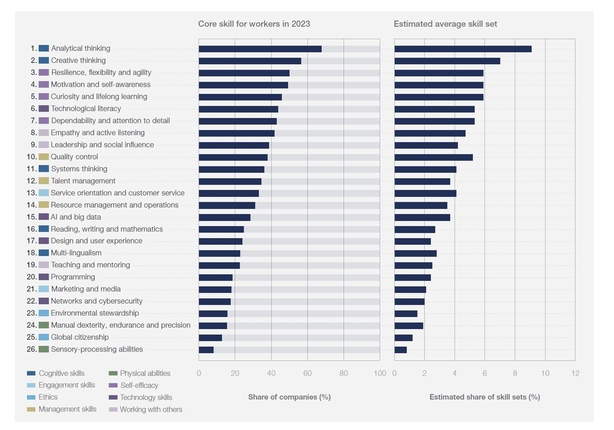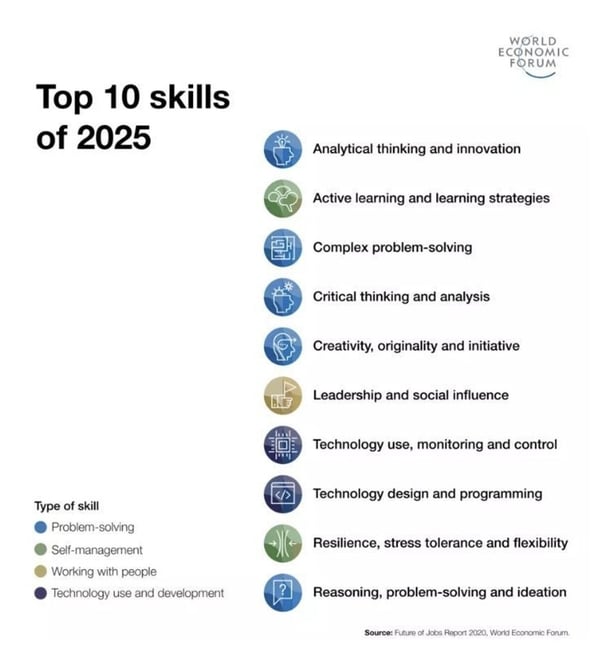Analysis: the skills we need to deal with workplace changes caused by AI turn out to be the skills we were not taught in school
It is estimated that 34% of all business-related tasks today are performed by machines, with the remaining 66% performed by humans. The World Economic Forum's Future of Work Report 2023 tells us that employers believe 44% of workers' skills will be disrupted in the next five years and that 50% of all employees will need reskilling by 2025. According to Boston Consulting Group, 33% of the top 20 skills in job adverts posted have changed since 2016 and one in five skills (22%) is entirely new.
It's tough to keep up! It seems that we are also hiring for skills and potential, rather than degrees and these skills are more soft skills rather the hard technical skills that AI is expert in.
We need your consent to load this rte-player contentWe use rte-player to manage extra content that can set cookies on your device and collect data about your activity. Please review their details and accept them to load the content.Manage Preferences
From RTÉ Radio 1's Today With Claire Byrne, Prof Alan Smeaton from DCU on what jobs won't disappear when AI takes over
So what are the must-have skills you need to have to futureproof yourself in the age of AI? According to globalisation expert Richard Baldwin, the inhuman speed of this transformation threatens to overwhelm our capacity to adapt. He offers three pointers: (i) avoid competing with AI and RI (remote intelligence); (ii) build skills in things that only humans can do in person; and (iii) realise that humanity is an edge not a handicap.
Marty Neumeier is the author of Metaskills: Five Talents for the Robotic Age and says these five meta-skills—our highly human abilities—are the best safeguard against business or career obsolescence. He summarises these as feeling (intuition and empathy), seeing (systems thinking), dreaming (applied imagination), making (design), and learning (autodidactics). These are not the skills we were taught in school.
It's clear that the reskilling revolution is upon us. "Skills are now the 'common currency' that will drive continual upskilling and reskilling efforts", believes Dr Gog Soon Joo, Chief Skills Officer at SkillsFuture.

When we look at the core skills required by workers today, some things stand out. Analytical thinking is considered to be a core skill by more companies than any other skill, and constitutes on average 9% of the core skills reported by companies Another cognitive skill, creative thinking, comes ahead of three self-efficacy skills – resilience, flexibility and agility; motivation and self-awareness; and curiosity and lifelong learning – in recognition of the importance of workers ability to adapt to disrupted workplaces.
But what about the future? The top 10 skills for 2025 cited by the WEF show a very clear leaning towards the softer side of skill development. The ability to be innovative, learn fast and tolerate stress have taken on new importance. Analytical thinking and innovation top the list of those skills deemed to be of greatest importance for workers in in 2025.

Active learning and learning strategies are the second highest skill deemed essential for future-readiness by the WEF. They describe learning strategies as "capacities for teaching others how to do something, including selecting and using training/instructional methods and procedures appropriate for the situation when learning or teaching new things."
Creativity and problem solving remain a constant in the list of skills required for the future. Scientists in Germany found that these skills happen when you let your mind wander. Psychologists at the University of Tübingen in southern Germany studied more than 250 people who were encouraged to engage in directionless, contemplation for free thinking.
The results suggest humans find it hard to let their minds wander, but that this is an underused talent. Smartphones have meant we have mostly lost the habit of free thinking. Other studies have shown that the phase just before falling asleep is highly creative, and that adapting to change forces us to think creatively.
We need your consent to load this rte-player contentWe use rte-player to manage extra content that can set cookies on your device and collect data about your activity. Please review their details and accept them to load the content.Manage Preferences
From RTÉ 2fm's Jennifer Zamparelli show, Tom Chatfield talks about his book How to Think, which views critical thinking as a skill to be continually practiced and developed.
Other suggestions around future skills have similar commonalities. Forbes' list of 9 soft skills that every employee will need in the Age of AI includes creativity; analytical (critical) thinking; emotional intelligence; interpersonal communication skills; active learning with a growth mindset; judgement and decision making; leadership skills; diversity and cultural intelligence and the ability to embrace change
Microsoft's Work Trend Index report, surveyed 31,000 people across 31 markets earlier this year. It found that the top three skills leaders believe are essential for an AI-powered future are analytical judgement, flexibility and emotional intelligence.
The bottom line is that we don't need to be frightened by AI
Bernard Marr is a world-renowned futurist and thought leader in the fields of business and technology, with a passion for using technology for the good of humanity. He suggests you focus on building the skills in areas robots can't do well: if you're concerned that your job might be one day outsourced to technology, the best thing you can do right now is work on your soft skills. Working on communication, strategic thinking, problem-solving, empathy, and creativity might eventually save your career from being taken over by robots, and even earn you a pay rise as well.
The bottom line is that we don’t need to be frightened by AI. We have an incredible human brain, which is far more complex, and mighty, than any AI in existence. Rather than being intimidated by AI and the inevitable changes it will bring to workplaces, we should all be considering how we might develop our unique human capabilities and acquire the softer skills which will become all the more important for the future of work.
The views expressed here are those of the author and do not represent or reflect the views of RTÉ




